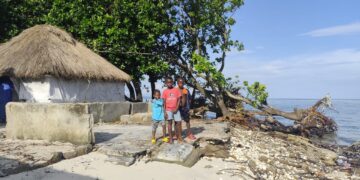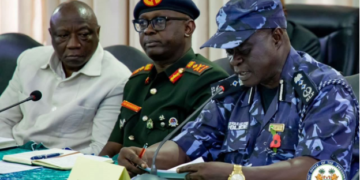By Alpha Amadu Jalloh
Author of “Monopoly of Happiness: Unveiling Sierra Leone’s Social Imbalance”
Recipient, Africa Renaissance Leadership Award
Kissi Teng Chiefdom, Eastern Sierra Leone, For over two decades, the village of Yenga, once a tranquil Sierra Leonean border community along the Makona River, has been under foreign military occupation. Despite peace agreements, diplomatic declarations, and promises from heads of state, the Guinean army remains entrenched, refusing to vacate land that legally and historically belongs to Sierra Leone.
This unlawful occupation has come to symbolize more than a territorial dispute. It speaks to the broader failure of regional solidarity, the impotence of African diplomacy, and the dangerous consequences of weak leadership.
“Yenga is not just land; it is our dignity. We are either a sovereign state or a silent hostage,” says Jalloh.
Yenga’s troubles began in 2001 at the height of Sierra Leone’s civil war. In an effort to combat rebel advances, Guinean soldiers were invited to assist. They entered Yenga as allies. But when the war ended in 2002 and the disarmament of rebels was completed, the Guinean military never left.
Subsequent peace efforts and formal agreements, like the 2002 Rabat Agreement, the 2005 Joint Boundary Commission, and even a 2021 joint statement by Presidents Bio and Condé, affirmed Yenga’s Sierra Leonean identity. Yet, Guinean troops remain, building infrastructure, manning checkpoints, and enforcing their rule.
“This is not peacekeeping. It is creeping annexation,” Jalloh writes. “Guinea has replaced diplomacy with bulldozers.”
Successive governments in Freetown have watched, issued statements, and done little else. While President Bio has expressed concern, his administration has yet to pursue legal action, international arbitration, or meaningful diplomatic pressure.
“Our weakness empowers Guinea,” says Jalloh. “When farmers are told to use Guinean francs to buy bread on Sierra Leonean soil, it’s not occupation, it’s economic colonization.”
Civilians in Yenga face daily intimidation, economic hardship, and a loss of national identity. Some have fled. Others endure under foreign rule while Freetown remains mute.
Regional and global institutions have been disturbingly quiet. ECOWAS, the African Union, the Mano River Union, and the UN have taken no tangible steps. Despite the African Union’s mission to safeguard sovereignty and peace, it has issued no resolution and sent no delegation. ECOWAS, once active in conflict mediation, remains disengaged. The United Nations, once a strong presence through UNAMSIL, has withdrawn into irrelevance on the issue.
“If justice only applies to oil-rich or powerful states, then Sierra Leone is on its own,” Jalloh warns.
Some observers argue Guinea’s military ruler, Colonel Mamady Doumbouya, is leveraging Yenga to project power and divert attention from internal pressures. By asserting dominance abroad, Doumbouya strengthens his image at home, at the cost of international law.
But the gamble is dangerous. It fuels regional distrust, stokes border tensions, and undermines West Africa’s fragile integration efforts.
Jalloh insists that the time for silence is over. He calls on Sierra Leone’s government to act decisively and fearlessly to restore the nation’s territorial integrity. He argues that Parliament must assert national sovereignty and republish past agreements, exposing Guinea’s violations.
International mechanisms must also be activated. The country must petition the UN and African Union for intervention and peace monitors. Sierra Leone should take legal action at the International Court of Justice and push for ECOWAS and Mano River Union summits to address the crisis.
Jalloh also recommends the formation of a Border Rights Commission to include local chiefs, journalists, and civil society actors, ensuring transparent oversight and advocacy. The media, both local and international, must play a vital role in amplifying the issue, and the diaspora should be encouraged to use its influence to raise awareness abroad.
Yenga is not a border post; it’s a battleground for dignity. Its fate is a litmus test for Sierra Leone’s sovereignty, the credibility of African diplomacy, and the resolve of small nations to defend their borders.
The world may be silent, but Sierra Leone must not be. “Yenga is ours,” concludes Jalloh. “Let us prove it, not with press releases, but with action.”

























